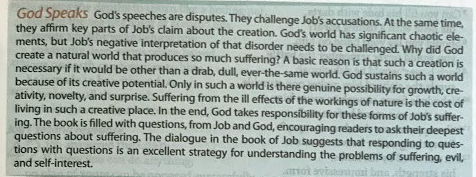Job 40: God asks Job to respond and he does in the beginning of this chapter. But with a very short response. Job pretty much tells God that he’s already said what he needed to say and he won’t say it again. God gives his second speech.
God’s second speech is very similar to his first. He directly questions and challenges Job, asking if he can do things that God can do. In this chapter God presents the behemoth and challenges Job, telling him that he can’t stand up to the behemoth (no human could).
Here’s an interesting sidebar addressing God’s talk with Job. I really like this bit of information and want to think more on it as I move forward in this process. I like the notion of questioning. It is a theme that has emerged a lot from this book and from earlier books.

Job 41: God continues with his speech, this time introducing us to Leviathan, a dangerous creature that no human could control. God describes a fierce and wild creature that all people would be too scared to even come across. He uses this to make his argument that if humans can’t stand up to something like Leviathan, who was created by God, then how could they question God. Here’s what he says: “8 Should you lay your hand on him, you would never remember the battle. 9 Such hopes would be delusional; surely the sight of him makes one stumble. 10 Nobody is fierce enough to rouse him; who then can stand before me?” (41:8-10)
Job 42: The final chapter of this book. Job responds in the first 6 verses. He acknowledges that he questioned things that he didn’t understand and went in directions that he didn’t need to go. He actually relents to God, indicating that he had gone to a place that he didn’t need to go. Clearly this makes God happy because God then addresses the friends and tells them that he is angry at them because what they said about him was wrong and what Job said was right. The chapter ends with an update on how Job’s life ended.
I have to admit, I don’t like how this ends. God comes down, talks to Job, challenges Job, and Job relents and caves. Job spent roughly 30 chapters (or more) challenging the prevailing thought at the time (that sin is the reason why anything bad happens) and directly challenging God to appear with him in court. Then God shows up, pretty much tells Job off, and Job relents. SERIOUSLY!!! I had hoped for more conversation between God and Job. This is truly a let down.
Psalm 86: An individual prayer for help. This one is supposedly written by David. The note from the CEB study bible is interesting:
Psalm 86 is one of only two prayers for help in Book III, and the only psalm in Book III credited to David. The fact that it interrupts a series of Korah psalms suggests that it may have been added to Book III so that all five books include a title about David. (p. 935 OT)
Just a fun little tidbit. The psalm itself reminds me of many earlier psalms reportedly written by David. He heaps praise on God, pretty much buttering him up so he can get help from God because he feels threatened.
Psalm 87: Another song of Zion. It celebrates the glory of Jerusalem.
Psalm 88: I do like reading study Bibles. Here’s an interesting tidbit from the notes in the CEB study bible:
Although Psalm 88 is a prayer for help, itis unique in the book of Psalms. It petitions God only once, and there is no direct expression of praise or trust. In short, Psalm 88 is clearly focused on complaint. The three reports of crying or calling out mark the beginning of three sections. (p. 937 OT)
The entire psalm does focus on complaint. The psalmist outlines different things that have happened to him and how God has left him to die. He feels that God is personally targeting him.
